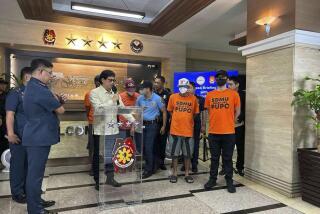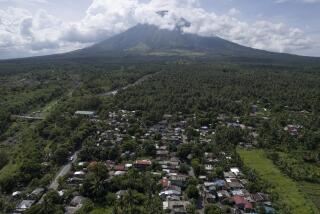7 Killed as Bomb Rocks Baghdad
BAGHDAD — A massive car bombing at an entrance to the multinational Green Zone killed at least seven people and injured 23 this morning, shaking much of the capital and shattering the relative calm it had experienced since the transfer of sovereignty to an interim Iraqi government.
A police officer at the scene, Haider Abdel Reda, said at least three of the dead were Iraqi national guardsmen. No Americans were killed, but one soldier was slightly wounded by shrapnel, U.S. Army Col. Mike Murray said. The entrance is used by journalists and other civilians to enter the vast compound that houses the U.S. and British embassies and the new Iraqi government.
The car was in line to be searched when it detonated in an apparent suicide attack. The bombing came on a national holiday that celebrates the fall of Iraq’s monarchy in 1958. It was the first major bombing in Baghdad since June 14, when an explosion killed 13 people traveling in a convoy of construction workers.
The attack came amid continuing hostage crises in Iraq. A group led by Palestinian-Jordanian militant Abu Musab Zarqawi on Tuesday executed one of two Bulgarian hostages, and the Philippine government indicated that it would withdraw its 51 troops from Iraq early in the hope of saving one of its citizens, a truck driver held by another group of kidnappers.
Also Tuesday, Iraqi police continued a crackdown on suspected kidnappers, thieves and contraband traders in Baghdad. More than 500 people were arrested in coordinated raids, apparently intended to show that the interim government, which assumed power June 28, was gaining ground in its declared battle against those responsible for widespread lawlessness since ousted President Saddam Hussein fled the capital during last year’s U.S.-led invasion. In October 2002, Hussein emptied Iraq’s prisons of murderers, rapists, thieves and other criminals.
The sweep, which began late Monday, targeted two major kidnapping rings believed to have targeted Baghdad professionals and employees of the new leadership. Police say dozens such Iraqis are being abducted each day by gangs demanding ransoms.
Al Jazeera satellite television said it had received a videotape of the Bulgarian’s slaying but refrained from televising it. A Bulgarian government spokesman later confirmed the execution.
There was no immediate word on the manner of the killing of the truck driver, identified by the Qatar-based TV channel as Georgi Lazov, 30. Lazov was seized near Mosul in late June along with fellow driver Ivailo Kepov, 32.
Zarqawi’s group, Jamaat al Tawhid wal Jihad, has claimed responsibility for beheading American businessman Nicholas Berg and South Korean interpreter Kim Sun Il and carrying out attacks that have killed U.S. troops and Iraqi civilians.
Grainy footage accompanying the Al Jazeera report showed a bearded man in an orange jumpsuit kneeling before three heavily armed gunmen. The Bulgarians’ captors, thought to be aligned with Osama bin Laden’s Al Qaeda terrorist network, had demanded that all Iraqi prisoners held by U.S.-led forces be freed by last Friday.
The Foreign Ministry said in a statement that the government was “coordinating the pullout of the humanitarian contingent” and that the number of its troops in Iraq had already been reduced to 43. An air force spokesman said a C-130 transport plane was preparing to leave the Philippines to pick up the remaining troops.
In Washington on Tuesday, the Bush administration said it opposed any early withdrawal of the Philippine force. “A decision by the Philippine government to withdraw their 51 troops ahead of schedule would send the wrong signal to terrorists,” White House Press Secretary Scott McClellan said.
In the Philippines, the government of President Gloria Macapagal Arroyo, usually a steadfast ally of the Bush administration, has been under strong public pressure to withdraw the country’s tiny force from Iraq to save the life of truck driver Angelo de la Cruz, a father of eight.
The plight of De la Cruz has aroused great sympathy in a country where 8 million people -- about 10% of the population -- have gone overseas to find jobs. About 4,000 Filipinos work in Iraq, where one died this year in a mortar attack.
Before the kidnapping, Manila planned to pull out its force by Aug. 20. The kidnappers have said they will behead their hostage if the Philippines does not withdraw by July 20.
Manila’s two-sentence announcement this morning left it unclear when the remaining troops and police would be withdrawn. There also was no indication whether eight members of the force had already departed in response to the kidnapping or for other reasons.
McClellan, the White House press secretary, said Tuesday that the administration was “seeking clarification” from the Philippine government.
Earlier, Philippine Deputy Foreign Secretary Rafael Seguis issued a plea to those holding De la Cruz to release him on humanitarian grounds.
“I appeal to you and to your kind hearts as Muslims to please release Angelo de la Cruz so that he can return to his family and children,” Seguis said.
He also reiterated that Manila would, “consistent with its commitment,” withdraw its contingent as soon as practically possible, without specifying if that would be before the deadline set by the captors.
In the case of the Bulgarian truck drivers, Bulgarian officials refused to accept the kidnappers’ demands, noting that in any case they had no control over prisoners held by U.S. forces.
In another kidnapping case, Iraqi militants holding an Egyptian man threatened early today to kill him within 72 hours if the Saudi company he works for didn’t leave Iraq, Al Jazeera reported.
Kidnappings of foreigners by insurgents have captured much of the world’s attention, especially in the wake of the two beheadings attributed to Zarqawi’s group.
But among average Iraqis, it is the daily rash of domestic crime that rattles them. Some cheered the move this week to combat lawlessness in their neighborhoods, while others bemoaned the police raids as heavy-handed and ineffective in rounding up kingpins.
Omar Mohammed, a jobless 31-year-old, said police failed to arrest the worst culprits.
“Yes, there are gangs, but they didn’t arrest any of them,” he said. “The police are either afraid to arrest the real criminals or they’re taking money from them.”
Witnesses said three civilians were killed and about 20 wounded in the raids, although police would not confirm those figures.
Authorities stormed a neighborhood on the east bank of the Tigris River late Monday and were reinforced by four Humvees carrying U.S. troops, said Raad Kamaal, a 20-year-old tailor.
“We welcome any step to improve security in Iraq, but this is a step back to the old regime,” said Mohammed Abdel Baqi, 37, a former officer in the disbanded Iraqi army.
Twelve-year-old Athra Kadhim wore a bandage on her right wrist where she said she had been grazed by a bullet. “There were guys wearing black and firing everywhere,” said Athra, still frightened hours after the encounter. “I was scared and crying.”
Sami Shahrabani, a hardware store owner who said he had been shaken down by a criminal gang a few days ago, hailed the raids as an overdue response to crime in Baghdad.
“Before [Hussein’s fall], the police only guarded the regime. Now they are guarding the people,” he said, adding that he hoped the sweeps would spread throughout the capital.
Television footage aired on the Al Arabiya satellite channel showed plainclothes police in one neighborhood pushing a handcart carrying at least two bodies. In another scene, young men arrested in the crackdown were shown huddled on the floor of a darkened room. A policeman standing over them jerked up the head of a suspect by his hair to show his face to the camera.
By midafternoon Tuesday, 527 people had been arrested and the crackdown was ongoing, Hamdani said.
The operation followed sweeps Monday in the northern city of Kirkuk and in restive towns of the so-called Sunni Triangle region.
Kurdish and U.S. security forces said they had arrested 15 insurgents tied to the Ansar al Islam extremist group.
Elsewhere in Iraq, gunmen attacked a U.S. convoy in Ramadi, causing several casualties, a witness said. U.S. military officials said they had no information on the report.
In the northern city of Mosul, gunmen ambushed an Iraqi National Guard patrol, killing one member and wounding nine. A military vehicle traveling near the Baghdad airport was also hit by insurgent fire. No casualties were reported.
Williams reported from Baghdad and Paddock from Manila. Special correspondents Ammar Mohammed, Said Rifai and Salar Jaff in Baghdad contributed to this report.
More to Read
Sign up for Essential California
The most important California stories and recommendations in your inbox every morning.
You may occasionally receive promotional content from the Los Angeles Times.











